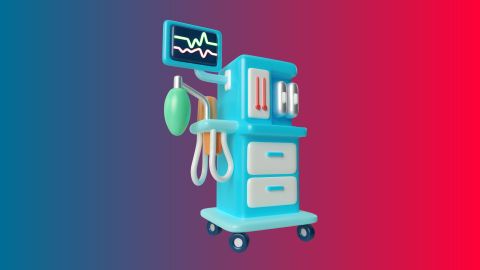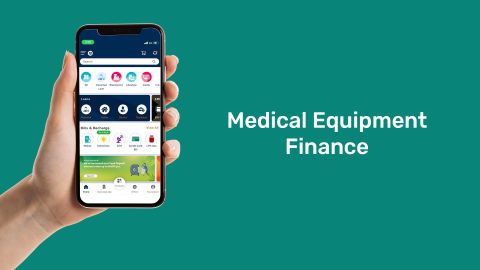The Complete Blood Count (CBC) machine is an indispensable medical device used to assess an individual's overall health. It is a device that provides essential information with CBC blood analysis about white blood cells, red blood cells, and platelets, among other vital features. There are different types of CBC machines tailored to meet distinctive medical needs. In this article, we will explore about CBC blood analysis the meaning, benefits, uses, financing options, precautions, and types of CBC machines.
What is the CBC machine and its uses?
Simply put, the complete blood count machine is a medical device used to analyse blood samples. CBC machine can perform tests like white blood cell count (WBC), red blood cell count (RBC), haemoglobin, haematocrit, RBC indices, platelets, and reticulocyte counts. The machine is a critical tool used by health care professionals to check for a range of diseases or conditions related to red blood cells, white blood cells, and platelets.
Types of CBC machines
Some common types of CBC machines include haematology analysers, haemoglobin machines, blood glucose metres, platelet counters, and urine analysers. These machines are specialised to offer varying types of blood analyses required for specific medical conditions.In many diagnostic labs, advanced tools like PCR machines are also used alongside CBC devices for broader diagnostic capabilities.
How does the CBC machine work?
These machines work by moving a small amount of blood through a narrow channel. As the blood cells go through the channel, a laser light hits them. This changes the direction of the cells, and sensors measure how much they are deflected. Using this data, the machine calculates the number of red and white blood cells in the sample. CBC machines are highly accurate and provide crucial information about a person's health.
How does the CBC machine work?
CBC machines are used to check blood samples accurately. A small amount of blood from a patient is placed into the machine, which passes the blood through a tiny pathway. As the blood cells move through this path, a laser light shines on them, changing their direction. Sensors in the machine detect how much the cells shift, helping it count the blood cells, measure the amount of hemoglobin, and check the size and shape of red blood cells.For sterilising sample handling equipment and preventing contamination, facilities often rely on autoclaves to maintain hygienic lab conditions.
Who should use the CBC machine?
A wide range of health care practitioners, including doctors, nurses, and medical lab technicians, use CBC machines. They can also be operated by hospitals and clinics to perform routine blood tests to monitor the health and wellness of their patients.In advanced medical setups, technologies such as the PET scanner are also employed for more comprehensive diagnostics.
Precautions to be taken while using a CBC machine
When using a CBC machine, certain safety precautions should be taken. It is essential to read and understand the machine's instructions before operating it. Wearing personal protective equipment like gloves and aprons can also help prevent exposure to infectious diseases. The machine should also be kept clean and disinfected after every use to prevent contamination.In emergency care environments, safety protocols also include having life-saving tools like an AED defibrillator readily available.
Features of a CBC Blood Cell Machine
Components Measured: CBC machines measure various blood parameters, including white blood cell count (WBC), red blood cell count (RBC), hemoglobin levels, hematocrit (the ratio of red blood cells to total blood volume), platelet count, average size of red blood cells (MCV), average amount of hemoglobin per red blood cell (MCH), and concentration of hemoglobin in a given volume of packed red blood cells (MCHC)
Safety Features: These machines include safety features like sample detection sensors, error detection systems, and automatic shut-off mechanisms to prevent accidents and keep operators safe while using the machine
Data Management: Many CBC machines are equipped with systems to manage data, storing patient information, test results, and other essential details. These systems make it easy to retrieve past results and generate reports when needed
Connectivity: Some CBC machines can connect to other systems via Ethernet or Wi-Fi, enabling easy integration with laboratory information systems (LIS) or electronic medical records (EMR)In India, compliance with CDSCO regulations is mandatory for such connected medical devices to ensure quality and safety standards are met.
Benefits of using a CBC machine
The complete blood count machine offers numerous benefits to both patients and healthcare practitioners. Quick and accurate blood analysis enables effective early diagnosis, thereby providing the ideal treatment and care for patients. CBC machines are also instrumental in tracking and monitoring patients with chronic illnesses like anaemia, leukaemia, and other blood disorders.
Applications of CBC Analyzer
Clinical laboratories: CBC machines are essential in clinical labs, playing a crucial role in regular blood tests, disease monitoring, and managing patient care
Hospitals: In hospitals, CBC machines are vital for diagnosing and treating both sudden and ongoing health issues that need blood analysis, like anemia, infections, and blood disorders
Primary care clinics: At primary care clinics, CBC machines help in the initial assessment of patients, offering important information for further tests and possible referrals
Research institutions: In research settings, CBC machines support studies and experiments focused on blood disorders, new treatments, and drug development
Components of CBC machine
A hemogram machine has several parts, and here are the main ones for a cell counter machine:
Sample processing unit: This part takes in the blood sample and gets it ready for testing. It may dilute the sample to get the right cell count and add special chemicals to help identify the cells
Analytic unit: This is the core of the CBC machine. It counts the different types of blood cells, such as red blood cells (RBCs), white blood cells (WBCs), and platelets
Software interface: Modern blood test machines come with easy-to-use software. This allows healthcare workers to enter patient details, choose the tests they want, and understand the results easily
Display and Printer: Hemogram machines have screens to show live data and built-in printers to print out the reports
Who can operate a CBC machine?
CBC machines can be operated by experienced medical lab technicians and doctors who have undergone procedural training. Anyone considering operating these machines should be aware that they must have advanced knowledge and an excellent understanding of medical procedures and safety protocols.
Explore CBC machine prices
Looking at the prices of CBC machines will show you many options tailored to different needs and budgets. There are small, compact machines perfect for smaller clinics, and more advanced ones meant for larger hospitals. The cost of these machines can vary quite a bit, with prices ranging from INR 229,000 to INR 870,000.
Here are some prices for CBC cell counters in India:
S.N. |
CBC Machine Product Models |
Price |
1 |
Erba H360 3 part |
₹ 2,90,000 |
2 |
Mindray BC 20s 3 part |
₹ 2,74,400 |
3 |
Mindray BC20 3 part |
₹ 2,65,000 |
4 |
Erba H560 5 Part |
₹ 5,40,000 |
5 |
Serachem SC 60 Plus |
₹ 2,85,000 |
6 |
Medonic M32 3 Part |
₹ 3,86,000 |
7 |
MINDRAY BC-5130 5 Part |
₹ 4,79,000 |
8 |
Agappe Mispa Count X 3 Part |
₹ 2,29,000 |
9 |
Diatron Abacus 380 - 3 Part |
₹ 3,12,800 |
10 |
Horiba ABX Micros 60 3 part |
₹ 2,76,000 |
*Prices are subject to change.
Where to purchase CBC machines?
CBC machines can be obtained from a range of suppliers and manufacturers worldwide. It is essential to purchase from a reputable supplier to ensure that the device received is of high quality, meets regulatory standards and adequately meets individual requirements.
Factors to consider before buying a CBC machine
When buying a blood test machine, the following are the key factors that will help you choose the best one for your needs:
Accuracy and precision: It is crucial that the machine accurately counts cells to correctly diagnose blood samples. Make sure the machine meets all accuracy standards and fits your specific needs
Throughput: Consider how many samples your facility processes daily. For up to 60 samples per hour, machines like Erba H360 or MINDRAY BC-5130 will work well. For higher output, such as 80 samples per hour, the Diatron Abacus 380 is a better choice
Ease of use: A machine with a simple, user-friendly interface and software helps ensure smooth operation and reduces errors. Also, consider how much training is needed to use the machine effectively
Reagents availability and cost: Choose a machine for which the chemicals (reagents) are easily available and affordable within your budget
Parameters: Look for machines that measure not only the basic complete blood count (CBC) but also other important blood parameters like different types of white cells or young red blood cells (reticulocytes)
Service and support: Opt for a well-known manufacturer or supplier that offers good technical support, quick maintenance, and easy access to spare parts to minimise any downtime if the machine breaks
Integration with Laboratory Information System (LIS): Ensure the machine can connect with your existing LIS software. This integration makes data management easy, helps in reporting results, and improves overall workflow in your lab
Financing options for buying CBC machines
Healthcare providers and medical facilities who consider investing in CBC machines need financing. Financing options such as loans are readily available from Bajaj Finserv Medical Equipment Finance, along with Doctor Loan, that provides healthcare providers with the financial support they need to invest in state-of-the-art medical devices and equipment. Business owners can take advantage of these options to invest in CBC machines and enjoy the benefits that come with owning one.
Check out More Related Medical Equipment
Medical Equipment |
||



